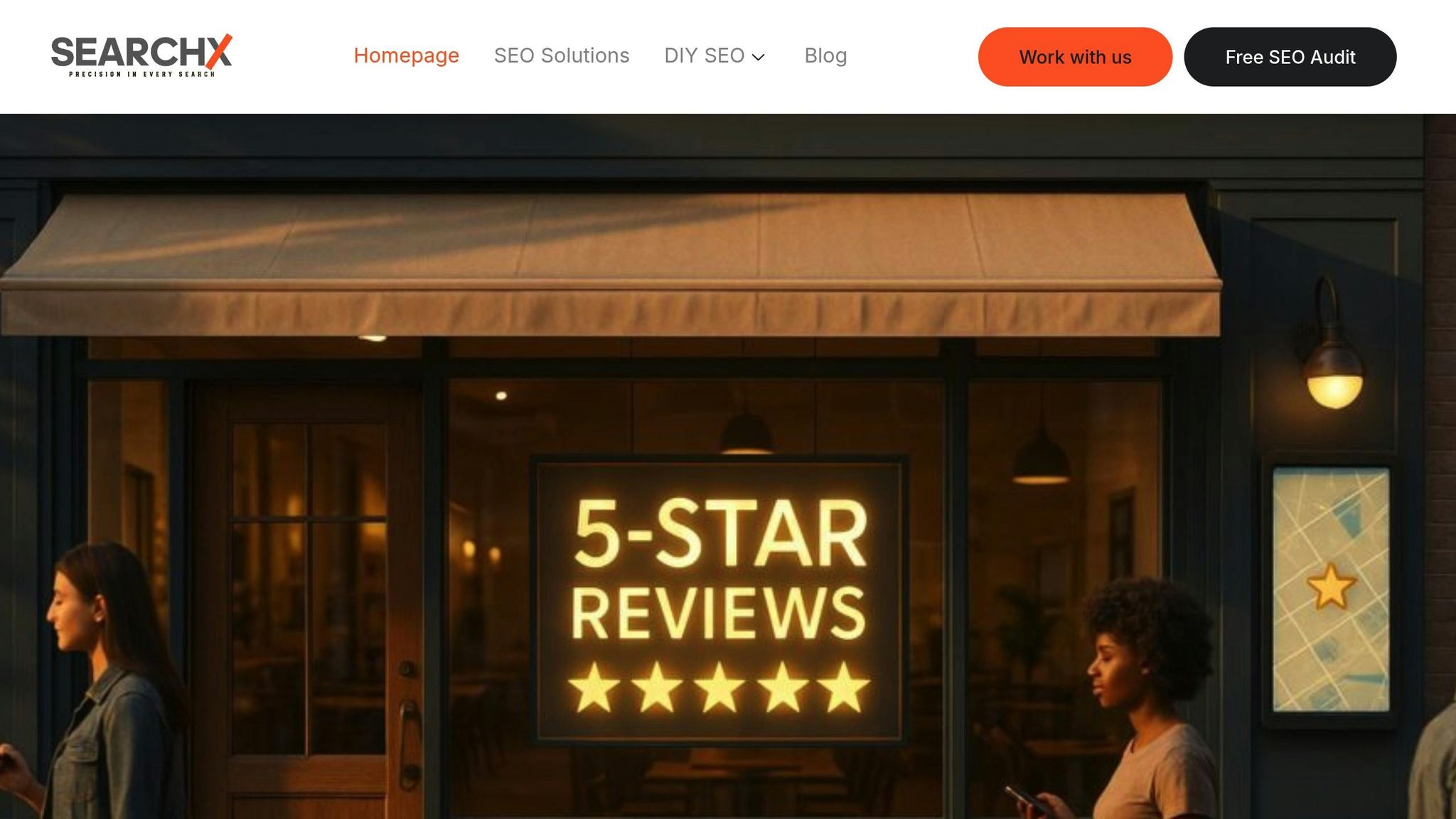Local SEO is a game-changer for service businesses in Austin. Why? Because it helps you connect directly with local customers searching for services like yours. Here’s what you need to know:
- 46% of Google searches are for local business details, and 72% of searchers visit a business within 5 miles.
- "Near me" searches have grown by 200% in recent years.
- High-intent searches like "emergency AC repair in Austin" lead to better conversions.
By optimizing your Google Business Profile, using Austin-specific keywords, and focusing on customer reviews, you can increase visibility and attract more clients. Local SEO strategies like creating neighborhood-specific content, leveraging schema markup, and building local partnerships are effective ways to stand out in Austin’s competitive market.
SearchX tools simplify this process with free audits, keyword research, and technical SEO support, helping businesses grow their online presence. Whether you manage SEO in-house or hire experts, consistent effort ensures success in connecting with Austin customers where they’re searching most – online.
Austin’s Local SEO Market Overview
Austin’s rapid expansion has created a competitive landscape for service-based businesses. To stay ahead, companies must understand and adapt to how locals search for services. This shifting behavior opens the door for highly targeted local SEO strategies.
Local Search Trends in Austin
Mobile and voice searches have become essential tools for finding local services in Austin. To stay relevant, businesses need to fine-tune their SEO efforts for hyper-local searches – think specific neighborhoods like South Austin or Cedar Park. Search traffic often spikes during certain times of the year, such as weekends for dog grooming or tax season for accounting services.
Austin’s rapid urban growth has also fueled a rise in neighborhood-specific searches. Emerging areas like The Domain, Mueller, and Easton Park are becoming hot spots for local queries. Seasonal patterns further shape search behavior, reflecting the city’s active, outdoor lifestyle. For instance, searches might surge for HVAC services during summer months or for outdoor equipment rentals in the spring. The growing popularity of voice search adds another layer, with queries like "Hey Google, where’s the closest car wash?" or "Alexa, find a plumber near me" becoming more common. These trends underscore the importance of crafting SEO strategies that are precise, conversational, and neighborhood-focused.
Why Local SEO Delivers High ROI
In this dynamic environment, local SEO stands out as a cost-effective way to connect with customers when they’re ready to act. High-intent searches – like someone looking for "emergency AC repair in Austin" – mean businesses can reach potential clients exactly when they need help. Unlike paid ads that require constant investment, a strong local SEO strategy builds lasting visibility and continues to generate leads organically over time.
For smaller service providers, local SEO offers an affordable alternative to expensive pay-per-click campaigns. By focusing on local search optimization, businesses can sustain long-term growth without the recurring costs of advertising. Plus, local search visitors tend to convert at higher rates. When a business appears in search results with strong reviews and detailed information, it creates trust and encourages customer loyalty. By targeting specific neighborhoods, companies can focus their resources where they’ll have the most impact, attracting high-quality leads.
Over time, the benefits of local SEO compound. As businesses earn positive reviews, establish local citations, and create location-specific content, their online presence strengthens. This not only boosts search rankings but also ensures ongoing customer engagement and trust in the community.
Local SEO Strategies for Austin Service Businesses
Standing out in Austin’s competitive service market isn’t easy, but a well-rounded local SEO strategy can make all the difference. Below are some proven approaches to help your business rank higher in local search results and attract more leads from your target neighborhoods.
Google Business Profile Optimization for Austin
Your Google Business Profile acts as your digital storefront. To make it work for Austin customers, fill out every section with accurate and consistent details. Include your exact address, phone number, and hours of operation, ensuring they match the information on your website.
Visuals play a big role here, too. Upload photos that highlight your work, your team, and your connection to the Austin community. Think images of your office, completed projects, or even your staff in action. Adding photos of recognizable Austin landmarks or neighborhoods you serve can further establish your local ties. Keep your profile fresh by updating these photos regularly.
Posting weekly updates can also help. Share news about your services, special promotions, or involvement in Austin events. For example, an HVAC company could post tips on prepping air conditioning systems before Austin’s famously hot summers kick in.
Lastly, use the services section to be specific about what you offer and where. Instead of listing "plumbing repair", try something like "emergency plumbing repair in South Austin" or "drain cleaning in Cedar Park." This level of detail helps Google understand your service areas better.
Austin-Specific Keywords and Content
To drive local traffic, focus on keywords that combine your services with Austin neighborhoods. Tools can help you find terms like "electrician in Mueller" or "dog grooming near The Domain" that people in Austin are searching for. Long-tail keywords like these often have less competition and attract more qualified leads.
Creating neighborhood-specific landing pages is another smart move. For instance, a landscaping company could have pages dedicated to "Lawn Care in Westlake Hills" or "Tree Trimming in Round Rock." These pages should include unique content about each area, local landmarks, and how your services meet specific community needs.
Blogging is also a great way to tie your services to Austin life. A cleaning service might write about "Preparing Your Home for SXSW Guests" or "Post-ACL Festival Cleanup Tips." These posts naturally incorporate local keywords while offering useful advice.
Don’t forget to weave Austin-related details throughout your website. Mention local events, weather patterns, or anything else relevant to your services. For example, a roofing company could discuss how Austin’s thunderstorms impact different roofing materials, showcasing both expertise and local knowledge.
Local Business Schema Markup Implementation
Schema markup helps search engines better understand your business and display it more prominently in search results. Start with LocalBusiness schema, which should include details like your name, address, phone number, hours, and service areas.
You can also add Service schema for each offering, specifying Austin service areas and including pricing details when applicable. This helps search engines connect your services to relevant local searches.
Review schema is another powerful tool. It pulls in star ratings from various platforms and displays them directly in search results, making your business more eye-catching. Additionally, Organization schema can highlight your business’s history, team, certifications, and ties to local Austin groups or chambers of commerce.
Once these technical elements are in place, you can shift your focus to managing reviews and building credibility.
Review Management and Local Credibility
Customer reviews are crucial for building trust with Austin residents. Start by encouraging satisfied customers to leave reviews on platforms like Google, Yelp, Facebook, and even industry-specific sites. Follow up with emails or texts that include direct links to your review pages to make the process easy.
Responding to reviews is just as important as collecting them. Thank customers for positive feedback and address any negative comments professionally. This shows potential clients that you care about delivering quality service.
Use tools to monitor reviews across platforms so you can respond quickly. Quick responses not only resolve issues but also demonstrate active engagement with your customers.
To make the review process even smoother, consider adding QR codes to invoices, sending follow-up messages, or simply asking customers directly after a job well done.
Local Partnerships and Backlink Building
Building relationships with other Austin businesses can benefit your SEO efforts. For example, a plumber might team up with local contractors, real estate agents, or hardware stores for mutual referrals and link exchanges.
Joining local organizations like the Austin Chamber of Commerce can also provide networking opportunities and valuable backlinks. Sponsoring events or sports teams is another way to gain mentions and links from community websites, all while strengthening your local presence.
You can also contribute expert insights to local publications like the Austin Business Journal or neighborhood blogs. Offering quotes or writing articles not only positions you as an authority but also earns backlinks that boost your local visibility.
Finally, get listed in local directories. Beyond the basics, look for Austin-specific directories, neighborhood sites, and industry listings. Citations from these sources often carry more weight than generic national directories.
How SearchX Tools Help Austin Businesses with Local SEO

Managing local SEO while juggling the daily demands of running a business can feel overwhelming. That’s where SearchX steps in, offering tools and services designed to simplify the process and deliver measurable results. For Austin service businesses, these resources help pinpoint opportunities, fix technical issues, and stand out in a competitive market. Here’s a closer look at how each tool can streamline your local SEO efforts.
Free Google Business Profile and Website Audit Tools
Understanding your current online presence is the first step to improving it. SearchX offers a free Google Business Profile (GMB) audit tool that evaluates key elements of your profile, including completeness, photo quality, review response rates, and posting frequency. These insights help ensure your profile is working as hard as it can to attract local customers.
The free website audit tool digs deeper into your site’s technical health and content performance, identifying issues like slow loading speeds, missing meta descriptions, broken links, and mobile responsiveness problems. For businesses in neighborhoods like South Lamar or East Austin, these technical details can determine whether you rank on the first page or get lost in the search results.
Both tools provide clear, prioritized recommendations you can act on immediately. Instead of guessing what might be holding back your online visibility, you’ll know exactly what to fix. By addressing these gaps, you can see faster improvements in local search rankings and better compete in Austin’s crowded service market.
Austin-Focused Keyword Research Services
Targeting the right keywords is essential for connecting with local customers, especially in a diverse city like Austin. SearchX’s keyword research service identifies high-intent, Austin-specific terms that resonate with your audience. From "emergency plumber Zilker" to "house cleaning Hyde Park", the service analyzes search volume, competition, and user intent to uncover the best opportunities.
This research often reveals overlooked keywords with lower competition and higher conversion potential. Many businesses focus on broad terms and miss out on neighborhood-specific phrases that can drive targeted traffic. SearchX also provides content suggestions to help you capture this valuable audience.
Seasonal trends unique to Austin are also factored in. For example, searches for air conditioning repair spike before summer festivals like ACL, while heating services see increased demand during unexpected winter freezes. By aligning your content with these patterns, you can better meet customer needs when they’re actively searching.
Local Business Schema Markup Guide and Technical SEO
Schema markup plays a vital role in local SEO, helping search engines better understand your business. SearchX offers a local business schema markup guide and professional technical SEO services to improve your site’s performance and visibility.
The schema markup guide provides step-by-step instructions for implementing LocalBusiness, Service, and Review schema. Adding this structured data can enhance your search result displays, showing star ratings and detailed business information that attract clicks.
For businesses that prefer expert assistance, SearchX’s technical SEO services handle everything from schema implementation to site speed optimization, mobile responsiveness, and crawlability improvements. These enhancements often lead to noticeable ranking boosts within weeks, especially for location-specific searches.
Austin businesses face unique challenges, such as ensuring fast site loading during high-traffic periods around major events and catering to mobile users searching for services on the go. SearchX addresses these needs, helping you stay competitive in a city where local search visibility can make or break your business.
Measuring Local SEO Performance in Austin
Tracking local SEO success isn’t just about watching your Google rankings climb. For service businesses in Austin, it’s crucial to monitor metrics that directly tie to revenue and client growth. The right data can reveal what’s driving results and what’s wasting your marketing dollars.
The focus should be on metrics that impact your bottom line, especially considering Austin’s competitive service market. Whether it’s analyzing neighborhood-specific rankings or evaluating the return on investment (ROI) from your Google Business Profile, a data-driven strategy can turn local SEO efforts into a reliable growth tool. Here’s a breakdown of the key metrics that connect your SEO work to actual revenue.
Key Metrics for Local SEO ROI
- Austin-specific keyword rankings: Keywords like "plumber South Austin" or "house cleaning Cedar Park" often bring in high-quality leads. These neighborhood-focused searches signal potential clients with immediate needs for local services.
- Google Business Profile performance: Keep an eye on metrics such as profile views, website clicks, direction requests, and phone calls. A well-optimized profile should show growth in these actions over time. The "Actions on your listing" section provides valuable insights into user engagement.
- Local organic traffic: Use tools like Google Analytics to monitor website visits from Austin and surrounding areas like Round Rock, Pflugerville, and Georgetown. This helps you measure how well your site attracts local interest.
- Conversion tracking: Set up goals in Google Analytics to track form submissions, phone calls, and bookings that come from organic traffic. This data connects your SEO efforts directly to revenue, giving you a clear view of what’s working.
- Monthly new reviews: Reviews play a big role in local rankings and customer trust. Track how many new reviews you receive each month on platforms like Google and Yelp. A steady flow of fresh reviews signals a strong local reputation.
SearchX SEO ROI Reporting Tools
SearchX simplifies the process of tracking these metrics by consolidating critical data into a single dashboard. This saves time and provides a clear overview of your local SEO performance.
- ROI tracking dashboard: This tool links your SEO metrics to revenue outcomes. Beyond just showing ranking improvements, it estimates the monetary value of your organic traffic by factoring in conversion rates and average customer value. This makes it easier to justify your SEO investment and allocate your budget wisely.
- Local ranking reports: These reports focus on Austin-specific search results, tracking your rankings for neighborhood-based keywords across different devices and locations. They also monitor your visibility in the local pack, organic results, and Google Business Profile searches.
- Competitor performance tracking: This feature shows how your local SEO performance compares to other service providers in Austin. It highlights competitors gaining traction in local search and identifies opportunities for you to improve your rankings. This is especially useful in industries like home services, legal, and healthcare.
For a deeper dive into calculating ROI, check out SearchX’s SEO ROI measurement guide.
DIY vs. Managed SEO Comparison
The way you measure SEO performance can also guide your decision between managing it in-house or outsourcing to professionals. Here’s a side-by-side look at the two approaches:
| Aspect | DIY Local SEO | Managed SEO Services |
|---|---|---|
| Monthly Cost | $200–500 (tools and time) | $3,000–12,000+ |
| Time Investment | 15–25 hours per month | 2–5 hours per month |
| Technical Expertise | Requires a learning curve | Professional expertise included |
| Results Timeline | 6–12 months for noticeable gains | 3–6 months for faster improvements |
| Risk Level | High (risk of errors) | Low (proven strategies) |
| Scalability | Limited by internal capacity | Easily scalable with growth |
| Austin Market Knowledge | Must research independently | Comes with local expertise |
| Tool Access | Requires individual subscriptions | Enterprise-level tools included |
DIY local SEO is ideal for businesses with the time and resources to learn the ropes. It involves mastering technical optimization, creating content, and building links. While the upfront costs may seem lower, the time spent on SEO could take away from other critical business activities. For a step-by-step guide, check out the DIY local SEO approach.
On the other hand, managed SEO services offer immediate access to seasoned professionals and proven strategies. SearchX’s managed plans start at $3,000 per month and include everything from local optimization to content creation and ongoing technical support. Many businesses find the ROI from managed services justifies the cost in a short time.
Ultimately, the choice depends on your business’s priorities and growth stage. Established businesses with a steady cash flow often benefit from professional services, while startups or smaller operations might start with DIY efforts and transition to managed services as they grow. In Austin’s competitive market, a consistent and professional approach to local SEO can make all the difference.
Conclusion: Winning Clients with Local SEO in Austin
Local SEO isn’t just another tool in the marketing toolbox for Austin service businesses – it’s a direct way to meet clients’ immediate needs. In a city as vibrant and diverse as Austin, businesses that prioritize local optimization put themselves ahead of the competition.
By focusing on strategies like fine-tuning your Google Business Profile or crafting content that resonates with specific neighborhoods, you’re not just increasing visibility – you’re driving real client growth. These efforts, when done right, create a measurable impact on your bottom line.
SearchX offers a range of solutions to help you dominate local search in Austin. From free Google Business Profile audits to advanced managed services starting at $3,000 per month, their tools and expertise are designed to give you the edge. Whether you’re managing SEO in-house or turning to professionals, aligning your strategy with your growth stage is key. In a fast-moving market like Austin, having the right expertise and consistent effort can make all the difference.
Ultimately, local SEO is about more than rankings – it’s about connecting with potential clients when they need you most. Each search represents an opportunity, and when your business consistently shows up at the top with strong reviews and clear contact information, you’re building a reliable, round-the-clock client acquisition system. By mastering these strategies, your business not only thrives but embodies the dynamic, competitive energy that defines Austin.
FAQs
How can service-based businesses in Austin optimize their Google Business Profile to attract more local clients?
To get the most out of your Google Business Profile (GBP) for local SEO in Austin, focus on keeping your profile up-to-date and detailed. Regularly check that your business hours, contact info, and location are accurate. Include high-quality photos showcasing your business and services, and select the service categories that best match what you offer.
Encourage satisfied customers to leave positive reviews, as these can significantly impact your local search rankings. Add local keywords to your business description to match search terms specific to Austin. You can also use local schema markup to boost your visibility in Google’s local pack and map results, making it easier for nearby customers to discover you.
What are some examples of local keywords service businesses in Austin can use to boost their online visibility?
To boost visibility in local search results, service businesses in Austin should incorporate geo-specific keywords like "Austin contractor," "digital marketing services in Austin," "Austin coworking spaces," or "SEO services Austin." These keywords are designed to attract local audiences actively seeking services in the area.
You can weave these terms into your website content, Google Business Profile descriptions, and blog posts. This approach increases your chances of showing up in local searches and connecting with potential clients right in your neighborhood.
Why is local SEO a budget-friendly option for service-based businesses compared to traditional advertising?
Local SEO is an affordable way for service-based businesses to connect with nearby customers who are already searching for their services. This focused method not only minimizes wasted advertising dollars but also offers a better return on investment (ROI) compared to broader options like TV or print ads.
What’s more, local SEO delivers results you can actually measure. Businesses can monitor performance and fine-tune their strategies to get the most out of their efforts. By optimizing key elements like your Google Business Profile and incorporating local keywords, you can draw in more clients – all without the hefty price tag of traditional advertising.




